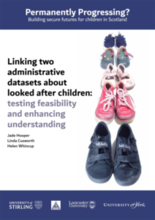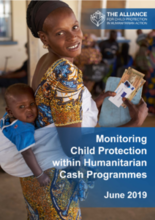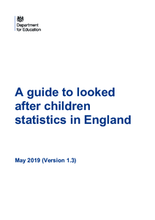Displaying 91 - 100 of 565
This article describes the process of revising a measure of out‐of‐home living restrictiveness to be culturally congruent for Portugal, providing preliminary data on validity and reliability, and discusses the feasibility of using this measure in Portugal.
This report on the linkage of Children Looked After Statistics (CLAS) with data from Scottish Children’s Reporter Administration (SCRA) is one strand of the Permanently Progressing? study. The study is the first in Scotland to investigate decision making, permanence, progress, outcomes and belonging for children who became ‘looked after’ at home, or away from home (with kinship carers, foster carers or prospective adopters) when they were aged five and under.
This Data Book from the Annie E. Casey Foundation explores how the child population, and childhood experience, of the US has changed since 1990. It also presents national and state data on 16 indicators of child well-being across four domains — health, education, family and community and economic well-being.
This paper from the Alliance for Child Protection in Humanitarian Action summarises findings from an initial scoping study, which seeks to review how child protection outcomes are captured when monitoring multi-purpose humanitarian cash programmes. The paper proposes a theory of change of the possible links between cash and child protection to inform the development of a monitoring strategy, including hypotheses that humanitarian cash might contribute to prevention of family separation, reduction of family violence, and supporting foster and temporary caregivers to care for separated and unaccompanied children.
This study synthetic cohort life tables and data from the Adoption and Foster Care Analysis and Reporting System to generate the first cumulative prevalence estimates of termination of parental rights.
This scoping review was undertaken to map survey methodologies for violence against children (VAC) measurement in Indonesia and other Southeast Asian countries and to identify key considerations for developing both methodologically sound and culturally appropriate VAC surveys in Indonesia and similar contexts.
The objective of this study was to determine the minimum set of cross-agency indicators that could accurately classify placement in out-of-home-care (OOHC) in Australia before age 13–14 years.
The Global Social Service Workforce Alliance hosted the 6th Annual Social Service Workforce Strengthening Symposium on the topic of using evidence as a catalyst for advocacy efforts to support the social service workforce.
Given the impact that institutional care has been found to have on psychological and cognitive outcomes, the authors make the case for the adaptation of Early Childhood Child Care HOME (EC-CC-HOME), a world-renowned instrument that assesses children’s child-care environment, to the Greek context.
This document provides a guide to looked after children statistics published by the UK Department for Education.




